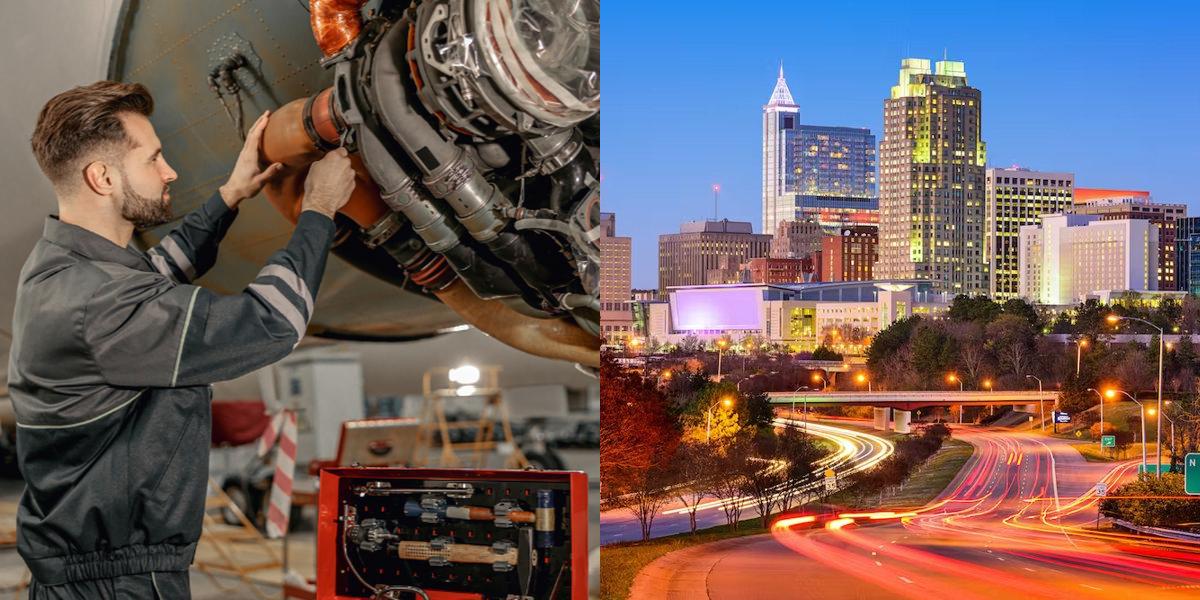How to Become an Aviation Mechanic in North Carolina

Are you interested in becoming an aviation mechanic in North Carolina? If so, you're in the right place. In this blog post, we will discuss what aviation mechanics do, where they work, the requirements to become one in North Carolina, and where you can find aviation mechanic classes.
3. Apply for Jobs
Once you have a strong resume and have built a network of contacts, start applying for jobs. Look for job openings on aviation job boards, company websites, and through professional organizations. Tailor your application materials to each job you apply for, highlighting the skills and experience that are most relevant to the position. Follow up with any potential employers to express your interest and to inquire about the status of your application.
4. Consider Apprenticeships or Internships
If you are having trouble finding a job right away, consider applying for apprenticeships or internships in the aviation industry. These positions can provide valuable hands-on experience and can also help you make connections in the industry. Even if the apprenticeship or internship is unpaid or low-paying, the experience you gain can be invaluable and can help you land a full-time job in the future.
5. Stay Up to Date with Industry Trends and Developments
The aviation industry is constantly evolving, with new technologies and regulations being introduced on a regular basis. It is important to stay up to date with these trends and developments to remain competitive in the job market. Attend industry conferences, read industry publications, and participate in professional development opportunities to stay current in your field.
Career Paths and Opportunities after Becoming an Aviation Mechanic
Becoming an aviation mechanic opens up a wide range of career paths and opportunities. Here are a few options to consider after obtaining your aviation mechanic certification.
1. Airline Maintenance Technician
Many aviation mechanics find employment with commercial airlines, working as maintenance technicians. In this role, you would be responsible for inspecting, repairing, and maintaining the aircraft in an airline's fleet. This can be a challenging and fast-paced job, but it also offers the opportunity to work on a variety of different aircraft and to travel to different locations.
2. General Aviation Mechanic
Another option is to work as a general aviation mechanic, providing maintenance and repair services for smaller, private aircraft. This can include everything from single-engine planes to corporate jets. General aviation mechanics often work for small repair shops or for private individuals who own their own aircraft.
3. Avionics Technician
If you have a particular interest in avionics systems, you may want to consider a career as an avionics technician. Avionics technicians are responsible for installing, maintaining, and repairing the electronic systems and components of an aircraft. This can include everything from navigation and communication systems to autopilots and flight data recorders.
4. Aircraft Inspector
Another career path to consider is becoming an aircraft inspector. Aircraft inspectors are responsible for conducting thorough inspections of aircraft to ensure they meet all safety and regulatory requirements. This can involve inspecting the structure of the aircraft, as well as its systems, components, and documentation. Aircraft inspectors often work for regulatory agencies, such as the FAA, or for airlines or maintenance repair organizations.
5. Education and Training
If you enjoy teaching and have a passion for sharing your knowledge and skills with others, you may want to consider a career in education and training. Many aviation mechanics go on to become instructors at aviation maintenance technician schools or at other educational institutions. This can be a rewarding career path that allows you to pass on your knowledge and expertise to the next generation of aviation mechanics.
Final Thoughts
Becoming an aviation mechanic is a rewarding and challenging career choice. It requires a combination of education, experience, and technical skills, as well as a passion for aircraft and a commitment to safety. By following the steps outlined in this article, you can start your journey towards obtaining your aviation mechanic certification and finding a job in the aviation industry. Whether you choose to work for a commercial airline, in general aviation, or in another area of the industry, a career as an aviation mechanic offers a wide range of opportunities and the chance to work on some of the most advanced and sophisticated machines in the world.
Dreambound offers a window into various career paths, so if you're considering a shift in your career, browse through these articles:

Alyssa Jane is part of the customer success team at Dreambound. She works with students, training providers, and employers, helping them have a smooth customer journey. She is also an ESL tutor and Licensed Psychometrician. She is fond of traveling, photography, and discovering new restaurants.




